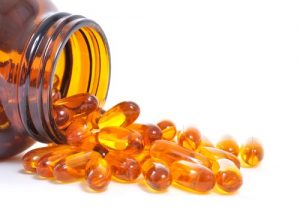Will The Omega-3 Controversy Continue?
 The prevalence of ADHD has increased dramatically in the last couple of decades. One study reported that the percentage of children diagnosed with ADHD has increased by 42% between 2003 and 2011. Another study reported an increase of 67% between 1997 and 2015. Currently, 10-12% of American schoolchildren are diagnosed with ADHD. That amounts to around 6 million children with ADHD, at a cost to taxpayers of over $45 billion.
The prevalence of ADHD has increased dramatically in the last couple of decades. One study reported that the percentage of children diagnosed with ADHD has increased by 42% between 2003 and 2011. Another study reported an increase of 67% between 1997 and 2015. Currently, 10-12% of American schoolchildren are diagnosed with ADHD. That amounts to around 6 million children with ADHD, at a cost to taxpayers of over $45 billion.
An estimated 65% of children with ADHD are taking medications to control their symptoms. Unfortunately, those medications don’t work for 20-40% of patients with ADHD. Even worse, ADHD medications come with serious side effects like loss of appetite and delayed growth, sleep disorders, nausea & stomach pains, headaches, moodiness and irritability.
Even more worrisome is that many children say they “just don’t feel right” while they are on the drugs. Finally, there is the unintended message we are sending our children that drugs are the solution to their problems.
It is no wonder that millions of parents are looking for more natural solutions for their child’s ADHD. One of the most popular natural approaches is supplementation with omega-3s. But do omega-3 supplements work, or is this just another myth created by supplement companies to lighten your wallet?
The scientific evidence is conflicting. Some clinical studies support the efficacy of omega-3 supplements for reducing ADHD symptoms. Other studies claim they have no benefit.
In today’s issue of “Health Tips From The Professor”, I review a recent meta-analysis (JP-C Chang et al, Neuropsychopharmacology, 43: 534-545, 2018) that attempts to provide a definitive answer to this question.
How Was The Study Done?
 This study was designed to answer three questions:
This study was designed to answer three questions:
1) Does omega-3 supplementation reduce ADHD symptoms?
2) Does omega-3 supplementation improve cognitive skills in children with ADHD?
3) Is there an association between omega-3 status and ADHD?
Previous meta-analyses on these topics had design flaws such as:
· Including both children and adult subjects.
· Including subjects with diagnosis other than ADHD.
· Including trials that supplemented with vitamins and other nutrients in addition to omega-3s.
The authors of this study tried to avoid these limitations by using the following criteria for the studies that were included in their meta-analysis.
1) The studies were randomized, double-blind, placebo-controlled trials of omega-3 supplementation with DHA and EPA alone or in combination.
2) The participants were school-aged children (4-12 years) and adolescents (13-17 years) who had a diagnosis of ADHD.
3) The study measured the effect of omega-3 supplementation on clinical symptoms of ADHD or measures of cognitive performance (omission errors, commission errors, forward memory, backward memory, and information processing).
4) The studies were large enough to measure statistically significant differences.
5) The studies were published in peer-reviewed journals.
With these criteria there were:
· Seven studies with 534 children looking at the effect of omega-3 supplementation on ADHD symptoms.
· Three studies with 214 children looking at the effect of omega-3 supplementation on cognitive performance.
· Twenty studies with 1276 children looking at the association between omega-3 status and ADHD.
Do Omega-3 Supplements Reduce ADHD Symptoms?
 The results of this meta-analysis were as follows:
The results of this meta-analysis were as follows:
1) Omega-3 supplementation significantly reduced ADHD symptoms reported by parents.
2) Omega-3 supplementation significantly improved cognitive measures associated with attention span (omission and commission errors). [Note: Omission errors consist of leaving important information out of an answer. Commission errors consist of including incorrect information in an answer.]
· Omega-3 supplementation did not improve cognitive measures associated with memory and information processing. This has also been reported in most previous studies.
· The best way to think of this is that children with ADHD are fully capable of learning their schoolwork. However, they may have trouble demonstrating what they have learned on exams because of omission and commission errors.
· In this context, omega-3 supplementation may help them perform better on exams and reduce test-taking anxiety.
3) For hyperactivity, only studies with EPA dosages of 500 mg per day or greater showed a significant reduction in symptoms.
4) Children diagnosed with ADHD have lower levels of DHA, EPA, and total omega-3s.
The authors concluded: “In summary, there is evidence that omega-3 supplementation … improves clinical symptoms and cognitive performances in children and adolescents with ADHD, and that these youth have a deficiency in omega-3 levels. Our findings provide further support to the rationale for using omega-3s as a treatment option for ADHD.”
They also said: “Our paper shows that EPA supplementation dosage >500 mg should be considered when treating youth with ADHD, especially those with predominantly hyperactivity/impulsivity presentation.”
Will The Omega-3 Controversy Continue?
 This is an excellent study, but it is unlikely to be the final word on this subject. That is because there is a fundamental flaw in all previous studies on this important subject, including the ones included in this meta-analysis.
This is an excellent study, but it is unlikely to be the final word on this subject. That is because there is a fundamental flaw in all previous studies on this important subject, including the ones included in this meta-analysis.
In the words of the authors: “In terms of ‘personalized medicine’, it is tempting to speculate that a subpopulation of youth with ADHD and low levels of omega-3s may respond better to omega-3 supplementation, but there are no studies to date attempting this approach.”
Until studies of omega-3 supplementation and ADHD symptoms include measures of omega-3 status before and after supplementation, those studies are likely to continue giving conflicting results. That is because:
· If most of the children in the study have low omega-3 status, we are likely to see a positive effect of omega-3 supplementation on ADHD symptoms.
· If most of the children in the study have high omega-3 status, we are likely to see a negative effect of omega-3 supplementation on ADHD symptoms.
What Does This Study Mean For You?
 While this study is unlikely to end the omega-3 controversy, it is a very well-designed study that combines the results of multiple double-blind, placebo-controlled clinical trials. In short, it is a very strong study.
While this study is unlikely to end the omega-3 controversy, it is a very well-designed study that combines the results of multiple double-blind, placebo-controlled clinical trials. In short, it is a very strong study.
Omega-3s have no side effects and multiple health benefits. If your child suffers from ADHD, omega-3 supplementation is worth a try.
However, we need to keep omega-3 supplementation in perspective:
· Not every child with ADHD will respond to omega-3 supplementation.
· Omega-3s alone are likely to reduce, but not eliminate, the symptoms.
· There are other natural approaches that should be considered.
You will find details on omega-3s and other natural approaches for reducing ADHD symptoms in an earlier issue of “Health Tips From The Professor”.
The Bottom Line
A recent meta-analysis looked at the effect of omega-3 supplementatation on ADHD symptoms. Here is a brief summary of the data:
1) Omega-3 supplementation significantly reduced ADHD symptoms reported by parents.
2) Omega-3 supplementation significantly improved cognitive measures associated with attention span (omission and commission errors). [Note: Omission errors consist of leaving important information out of an answer. Commission errors consist of including incorrect information in an answer.]
· Omega-3 supplementation did not improve cognitive measures associated with memory and information processing. This has also been reported in most previous studies.
· The best way to think of this is that children with ADHD are fully capable of learning their schoolwork. However, they may have trouble demonstrating what they have learned on exams because of omission and commission errors.
· In this context, omega-3 supplementation may help them perform better on exams and reduce test-taking anxiety.
3) For hyperactivity, only studies with EPA dosages of 500 mg per day or greater showed a significant reduction in symptoms.
4) Children diagnosed with ADHD have lower levels of DHA, EPA, and total omega-3s.
The authors concluded: “In summary, there is evidence that omega-3 supplementation … improves clinical symptoms and cognitive performances in children and adolescents with ADHD, and that these youth have a deficiency in omega-3 levels. Our findings provide further support to the rationale for using omega-3s as a treatment option for ADHD.”
They also said: “Our paper shows that EPA supplementation dosage >500 mg should be considered when treating youth with ADHD, especially those with predominantly hyperactivity/impulsivity presentation.”
For more details on the study and a perspective on omega-3 supplementation compared to other natural approaches for reducing ADHD symptoms, read the article above.
These statements have not been evaluated by the Food and Drug Administration. This information is not intended to diagnose, treat, cure or prevent any disease.
